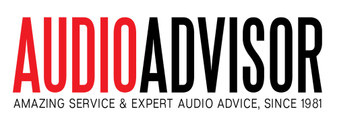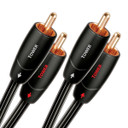Entry-Level Analog Excellence
Tower is the new AudioQuest entry-level analog interconnect offering performance that you'd expect would cost a whole lot more. Tower has Solid Long-Grain Copper (LGC) conductors, Foamed-Polyethylene insulation, a Metal-Layer Noise-Dissipation System (NDS), and Asymmetrical Double-Balanced Geometry.
This version of Tower has Cold-Welded Gold-Plated RCA Plugs and RCA-to-RCA termination.
Tower's Inspiration
The image of Londons dramatic Tower Bridge is so famous that it is often mistakenly thought of as London Bridge. Tower Bridge, completed in 1894, is an unusual combination of suspension bridges on the land side of the towers, and dual bascule spans in the center. As with the many bascule bridges in St. Petersburg, Russia and over the Chicago River, moving this weight-balanced roadway requires comparatively little energy, making it very efficient for allowing river traffic to pass. Tower Bridges original hydraulic accumulators were a significant advance in storing the energy required to be able to open the two 1,000 ton bascules in only five minutes.
Solid Long-Grain Copper (LGC) Conductors
Solid conductors eliminate strand-interaction distortion. Evergreens solid Long-Grain Copper allows a smoother and clearer sound than cables using regular OFHC (Oxygen-Free High-Conductivity) copper. OFHC is a general metal industry specification regarding loss without any concern for distortion. LGC has fewer oxides within the conducting material, less impurities, less grain boundaries, and definitively better performance.
Foamed-Polyethylene Insulation
Any solid material adjacent to a conductor is actually part of an imperfect circuit. Wire insulation and circuit board materials all absorb energy (loss). Some of this energy is stored and then released as distortion. Tower uses air-filled Foamed-Polyethylene Insulation on both conductors because air absorbs next to no energy and Polyethylene is low-loss and has a benign distortion profile. Thanks to all the air in Foamed-PE, it causes much less of the out-of-focus effect common to other materials.
Metal-Layer Noise-Dissipation System (NDS)
100% shield coverage is easy. Preventing captured RF Interference from modulating the equipments ground reference requires AQs Noise-Dissipation System. Noise-Dissipation System prevents a significant amount of RFI from reaching the equipments ground plane.
Asymmetrical Double-Balanced Geometry
Purpose designed for single-ended applications, Asymmetrical Double-Balanced Geometry offers a relatively lower impedance on the ground for a richer, and more dynamic experience. While many single-ended cable designs use a single path for both the ground and the shield, Double-Balanced designs separate the two for cleaner, quieter performance.
Cold-Welded Gold-Plated RCA Plugs
This plug design allows for a connection devoid of solder, which is a common source of distortion. Because the ground shells are stamped instead of machined, the metal can be chosen for low distortion instead of machinability.















